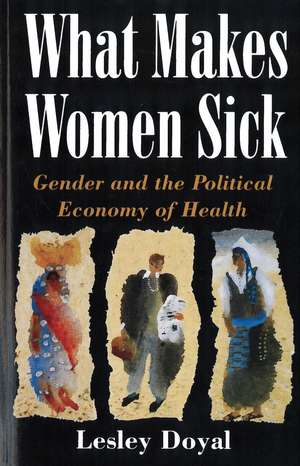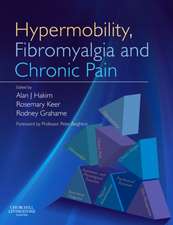What Makes Women Sick: Gender and the Political Economy of Health
Autor Lesley Doyalen Limba Engleză Paperback – mai 1995
What makes women sick? To an Ecuadorean woman, it’s nervios from constant worry about her children’s illnesses. To a woman working in a New Mexico electronics factory, it’s the solvents that leave her with a form of dementia. To a Ugandan woman, it’s HIV from her husband's sleeping with the widow of an AIDS patient. To a Bangladeshi woman, it’s a fatal infection following an IUD insertion. What they all share is a recognition that their sickness is somehow caused by situations they face every day at home and at work.
In this clearly written and compelling book, Lesley Doyal investigates the effects of social, economic, and cultural conditions on women’s health. The “fault line” of gender that continues to divide all societies has, Doyal demonstrates, profound and pervasive consequences for the health of women throughout the world. Her broad synthesis highlights variations between men and women in patterns of health and illness, and it identifies inequalities in medical care that separate groups of women from each other. Doyal’s wide-ranging arguments, her wealth of data, her use of women’s voices from many cultures—and her examples of women mobilizing to find their own solutions—make this book required reading for everyone concerned with women’s health.
In this clearly written and compelling book, Lesley Doyal investigates the effects of social, economic, and cultural conditions on women’s health. The “fault line” of gender that continues to divide all societies has, Doyal demonstrates, profound and pervasive consequences for the health of women throughout the world. Her broad synthesis highlights variations between men and women in patterns of health and illness, and it identifies inequalities in medical care that separate groups of women from each other. Doyal’s wide-ranging arguments, her wealth of data, her use of women’s voices from many cultures—and her examples of women mobilizing to find their own solutions—make this book required reading for everyone concerned with women’s health.
| Toate formatele și edițiile | Preț | Express |
|---|---|---|
| Paperback (2) | 254.93 lei 6-8 săpt. | |
| Rutgers University Press – mai 1995 | 254.93 lei 6-8 săpt. | |
| Bloomsbury Publishing – 18 iun 1995 | 264.35 lei 6-8 săpt. |
Preț: 254.93 lei
Nou
Puncte Express: 382
Preț estimativ în valută:
48.78€ • 52.16$ • 40.67£
48.78€ • 52.16$ • 40.67£
Carte tipărită la comandă
Livrare economică 17 aprilie-01 mai
Preluare comenzi: 021 569.72.76
Specificații
ISBN-13: 9780813522074
ISBN-10: 0813522072
Pagini: 296
Dimensiuni: 140 x 216 x 20 mm
Greutate: 0.4 kg
Ediția:None
Editura: Rutgers University Press
Colecția Rutgers University Press
ISBN-10: 0813522072
Pagini: 296
Dimensiuni: 140 x 216 x 20 mm
Greutate: 0.4 kg
Ediția:None
Editura: Rutgers University Press
Colecția Rutgers University Press
Notă biografică
LESLEY DOYAL is a Professor for Health and Social Care, School of Policy Studies, at the University of Bristol. She has published widely on health policy and women’s studies. Her Previous books include The Political Economy of Health and HIV and AIDS: Setting a Feminist Agenda.
Cuprins
Acknowledgments
1 In Sickness and in Health
2 Hazards of Hearth and Home
3 Safe Sex?
4 Regulating Reproduction
5 A Labour of Love
6 Waged Work and Well-being
7 Abusing Women
8 Women's Movements for Health
Bibliography
Index
1 In Sickness and in Health
2 Hazards of Hearth and Home
3 Safe Sex?
4 Regulating Reproduction
5 A Labour of Love
6 Waged Work and Well-being
7 Abusing Women
8 Women's Movements for Health
Bibliography
Index
Descriere
What makes women sick? To an Ecuadorean woman, it’s nervios from constant worry about her children’s illnesses. To a woman working in a New Mexico electronics factory, it’s the solvents that leave her with a form of dementia. To a Ugandan woman, it’s HIV from her husband's sleeping with the widow of an AIDS patient. To a Bangladeshi woman, it’s a fatal infection following an IUD insertion. What they all share is a recognition that their sickness is somehow caused by situations they face every day at home and at work.












